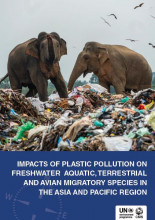Impacts of Plastic Pollution on Freshwater Aquatic, Terrestrial and Avian Migratory Species in the Asia and Pacific Region
This study identifies the impacts of plastic pollution on land and freshwater migratory species protected by the Convention on the Conservation of Migratory Species of Wild Animals (CMS).
The CMS report is the result of a collaboration between CMS and the UN Environment Programme as part of the Japan-funded CounterMEASURE II project to identify sources and pathways of plastic pollution in river systems in Asia.
Plastic pollution is a global issue with plastic waste flowing into oceans from rivers. However, not all plastic pollution reaches the ocean, and can impact species that live in and around river basins. Plastic pollution is a particular problem in the Asia-Pacific region. Two case studies in the report focus on the species of the Mekong and the Ganges.
The report calls for more effective waste management, recycling, and design of products, preventing plastic pollution at the source. It also cites the need for increased research efforts to understand the negative effects of plastic pollution on organisms and ecosystems, particularly on terrestrial species that have been poorly studied.
Prepared for the CMS Secretariat by the National Oceanography Centre (NOC), this publication is a significant first step towards closing the knowledge gap on the impacts of plastic pollution on CMS-listed species in terrestrial and freshwater ecosystems in the Asia-Pacific region.
Related content

| Author(s) | Alice A. Horton Isobelle Blissett |
|---|---|
| Published Date | August 2021 |
| Publication Language | English |
| Publisher | CMS Secretariat |
| Type | Technical Reports |
| CMS Instrument | CMS |
COVID-19 & MIGRATORY SPECIES
Facts and Information about the Coronavirus Disease (COVID-19) and Wildlife. Learn more


